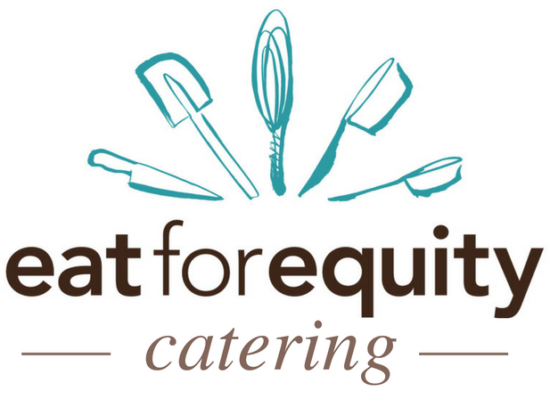Sourcing
Eat for Equity Catering promotes and models equitable and sustainable food sourcing.
One of the ways in which we build equity in our communities is in our food sourcing. To us, equity means that the food we cook and serve should be as equitable as the causes we support.
We prioritize purchasing from local, organic, and fair-trade producers.
Almost all of our ingredients are either local or organic. In 2017, an estimated 49% of our food dollars was spent with local sources and an estimated 40% was either organic or fair trade. In 2018, our goal is to source 80% of our ingredients from either local or organic producers and processors.
We prioritize purchasing from businesses owned and/or run by women, minorities, cooperatives, or nonprofits
In 2017, 68% of our food dollars was sourced from cooperative, women- or minority-owned businesses.
Where do we get our produce?
We purchase as much as possible in season from local producers, like Hmong American Farmers Association.
We source additional organic and local produce from Co-op Partners Warehouse. Co-op Partners Warehouse is a local and organics distributor based in St. Paul and operating throughout the upper Midwest. Co-op Partners Warehouse is also where we source wholesale dairy, eggs, oils, and grains.
Where do our animal products come from?
All of our meat purchases are local and grass-fed, free range, wild-caught, and/or organic. All our milk is local and organic, and the cheeses we use are almost all local and most are organic. We use Kadejan chicken, Pastures a’ Plenty pork, Sockeyed Salmon. Our milk and cream come from Organic Valley, and our eggs come from Larry Schultz.
We prioritize purchasing from local, organic, and fair-trade producers.
What does Local mean to us?
Products are local if they are grown in the five-state region around us (MN, WI, IA, ND, SD), or its produced or processed locally [beyond repackaging]. Local products can be either organic or conventionally grown.
For example, You Betcha Kimchi produces and ferments its kimchi at Good Acre in St. Paul, and sources its organic cabbages and radishes primarily [but not exclusively] from local producers. Because the bulk of processing takes place locally, we consider You Betcha Kimchi a local product.
What does Organic or Fair Trade mean?
Organic is the way agricultural products are grown and processed. It includes a system of production, processing, distribution and sales that assures consumers that the products maintain the organic integrity that begins on the farm. Organic certification guarantees that there are no toxic and synthetic pesticides or fertilizers; no GMO ingredients [Genetically Modified Organism]; no antibiotics or synthetic growth hormones; no artificial flavors, colors, or preservatives; and no sewage sludge or irradiation. More information about organics from the USDA.
Fair Trade is the economic relationship between consumers and producers in developing countries. When farmers can sell on fair trade terms, it provides them with a better deal and improved terms of trade. This allows them the opportunity to improve their lives and plan for their future. More information about fair trade from Fair Trade International.
What does Conventional mean to us?
“Conventional” means food that is neither organic or grown locally. For example, salt is a product of which is to hard or impossible to find organic varieties.
We prioritize purchasing from businesses owned and/or run by women, minorities, cooperatives, or nonprofits.
What does it mean to be a cooperative or nonprofit?
Cooperatives and nonprofits are different ways businesses can structure and govern themselves.
Cooperatives are owned and run jointly by its members, who share in the profits or benefits. Examples include:
Nonprofits are mission-driven, tax-exempt organizations that are owned by the community and with oversight by a board of directors. Eat for Equity Catering is owned by an nonprofit, Eat for Equity. Other nonprofit ownership examples include:
- Hmong American Farmers Association
- Peace Coffee [owned by the Institute on Agriculture and Trade]
- Women’s Environmental Institute
- Main Street Project.
What does it mean to be a business owned and/or run by women or minorities?
If at least a third of the business is owned by women and/or people of color, we consider it to be a women- or minority-owned business. Or, if executive leaders are women or people of color, we consider it to be a women- or minority-run business. Examples of these businesses include:
- Classics Provisions
- Beez Kneez
- Green Bee Juicery
- Isadore Nut Company
- Punk Rawk Labs
- You Betcha Kimchi.
For example, Punk Rawk Labs is co-owned by three women, Alissa, Julie, and Heidi.
For example, You Betcha Kimchi is co-owned and co-run by a husband and wife team, Joe and Iman. Because half of the business is owned by a woman, we consider You Betcha Kimchi a women-owned business.
